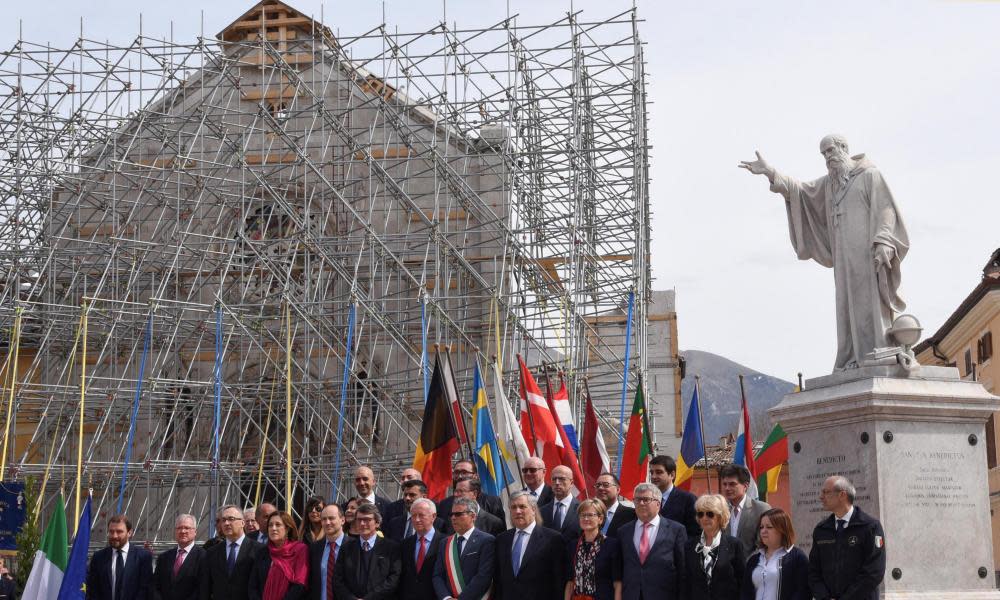The Guardian view on the treaty of Rome: respect the EU’s founding values | Editorial

It is poignant and appropriate that Theresa May is missing Saturday’s meeting of European leaders marking the 60th anniversary of the treaty of Rome. The UK was not among the six founder nations of the Economic Community that evolved into today’s EU, although that is not a requirement of attendance. Twenty-seven nations will be represented in the Italian capital. Out of courtesy to fellow heads of government, Mrs May has chosen to be absent from an occasion whose symbolic purpose is affirming principles to which Brexit is an affront.
Mrs May does not want to undermine European solidarity. The prime minister and her secretary of state for exiting the EU, David Davis, often state their hope that the EU will thrive without Britain and that the two sides can enjoy a fruitful partnership post-separation. But they cannot explain how that outcome is to be reached.
A more destructive dynamic is available. Mrs May could find that the expectations of a domestic audience, wound up by the most aggressively anti-EU segments of her party and the press, make compromise impossible. That would embolden those in Brussels – currently a small minority – who approach Brexit as an exercise in cautionary discipline, demanding punitive divorce terms to prove the folly of departure lest other Europeans are tempted to follow the British model.
Michel Barnier, the commission’s chief negotiator, has made it clear he prefers amicable settlement. “When a country leaves the union, there is no punishment,” he said in a speech last week. But he also warned of grim consequences for the UK if no agreement is reached within the two-year framework stipulated by the Lisbon treaty. That was a rebuke to Conservatives who talk up the prospect of Britain crashing out of the EU without a deal, as if that were an opportunity to be seized. In truth, it would be an act of economic and diplomatic vandalism spreading harm in all directions.
European leaders are forced to strike a balance between respecting Britain’s democratic choice and underlining the lack of wisdom – as they see it – of that choice. Their position would be easier if the EU could be depicted as a dynamic project, resilient to external shocks, with a clear, mutually agreed destination. It isn’t. The anniversary of its founding document has provoked more soul-searching than celebration. Brexit is not the only cause of anxiety.
The eurozone crisis and Greek bailouts left unfinished business, both in terms of financial architecture to ensure a stable single currency and of cultural animosity between debt-laden Mediterranean nations and Germany, their strictest creditor. There are tensions on an east-west axis as Poland and Hungary dabble in authoritarian modes of nationalism that offend the liberal spirit in which the union was founded. It doesn’t help that the current Polish government is pursuing a vendetta, born of old Warsaw-based rivalries, against Donald Tusk, permanent EU council president. It has been hard enough for EU leaders to draft a joint statement for Saturday’s summit, let alone devise and stick to an agenda for renewal.
It has always been easier to find reasons why the EU shouldn’t work than to explain how it does. The project is sustained by political will as much as economic or strategic logic. That will was born of moral determination to bury the continent’s blood rivalries and atone for its ethnic and religious persecutions – an exercise that has, by any historical measure, succeeded admirably. Past success is no guarantee of an enlightened and peaceful future. But the determination to navigate there is a force more powerful than many UK politicians recognise. The habit of vilifying the EU as an enemy of democracy obscures its function as democracy’s institutional underwriter.
There is a particularly virulent strain of British Euroscepticism that sees Brexit not just as a national liberation but as a force for revolutionary contagion, accelerating a great unravelling. Mrs May does not share that view, but she shares a party with its proponents and indulges their prejudices on other matters. Their saboteur ethos must not be allowed to contaminate the coming negotiations. The UK has always been an ambivalent European in the sense that it came late to the project and its political culture never internalised the foundational principle: strength through shared sovereignty. It is unclear how that vision can be renewed for another 60 years but it is certain that the ambition is a just and decent one. No one in Britain should want it to fail.

 Yahoo News
Yahoo News 
